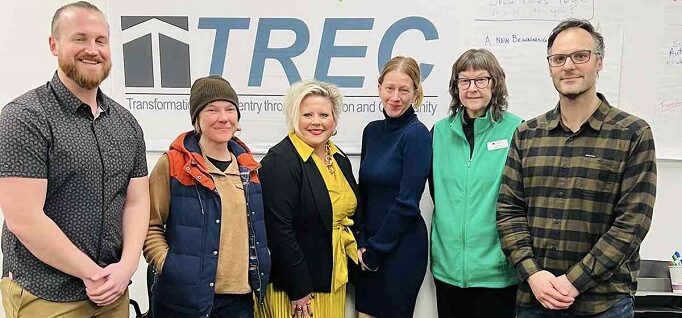Serving justice-impacted students
By Minneapolis College
April 18, 2024
Minneapolis College partners with businesses, community organizations, school districts, and individuals on workforce development, service, philanthropy and more to promote student success and advance its mission of providing access to the transformative power of education.
Transformation and Re-entry Through Education and Community (TREC) is a partnership between Minneapolis College, Metropolitan State University, and the University of Minnesota. The program focuses on offering degree programs at three state correctional facilities: Stillwater, Lino Lakes and Faribault.
The TREC partnership offers an associate degree track through Minneapolis College and a bachelor’s degree track through Metropolitan State University. The U of M supports these degree programs by creating opportunities for members of its community to teach courses inside facilities and contribute to co-curricular programming.
The degree-offering TREC partnership between Metro State University and Minneapolis College is one of the strongest examples of how deep, authentic collaboration between Minnesota State institutions can rapidly increase access and attainment for Minnesotans who are traditionally excluded from higher education. In 2019, before TREC began, there were only 12 currently incarcerated full-time college students.
In less than three years, TREC has built one of the more sizable college-in-prison programs in the nation. TREC is unique because it was built as a statewide model led by access-oriented institutions. The program enrolls almost 300 students, and by end of summer 2024 will already have graduated almost 40 students with bachelor’s degrees and over 70 students with associate degrees and certificates.
Programmatic funding is provided through grants and donations from Ascendium, Jobs for Future, DEED, the Office of Higher Education, and the Minneapolis College Foundation. The program was awarded the U.S. Department of Education’s Second Chance Pell experimental site, allowing incarcerated students to become eligible for Federal Pell Grants.
The Minneapolis College TREC program is a collaborative initiative between Student Affairs and Academic Affairs that encompasses a myriad of components from degree offerings to student programming and engagement. Currently staffed by three employees, the program plans to hire a director in the upcoming months.
TREC Resource Center Offers a Place of Belonging
To support justice-impacted students, Minneapolis College recently opened a TREC Resource Center on campus. A justice-impacted student is someone who may have previously been incarcerated, has had a family member involved in the justice system, or has been affected by the justice system at some point in their lives. The TREC Resource Center provides a dedicated space for these students; a quiet space to come together for support, offering re-entry workshops and programming, a place to study, access to computers, and a place of belonging.
“People are often judged by the worst decisions in their lives,” says Sarah Lemanczyk, TREC faculty and program facilitator, who notes that in the TREC Resource Center students can relax and feel at home. “Their ‘back story’ doesn’t matter,” she says.
Research shows that access to higher education for people impacted by the justice system is vitally important in leveling the playing field and in pulling families out of generational poverty and out of harm. It can drastically change the lives of students, families, and the community. Students re-entering the community have a high need for basic support services, and the TREC Resource Center will serve as an incubator for student success.
According to TREC program coordinator Michael Valesano, “Higher education is proven to be a key factor in breaking cycles of incarceration while strengthening students’ self-confidence and connections to their families, communities, and the world at large. We intentionally focus on intervening in cycles of harm by shrinking the space between the inside and outside.”
This article originally appeared here.



